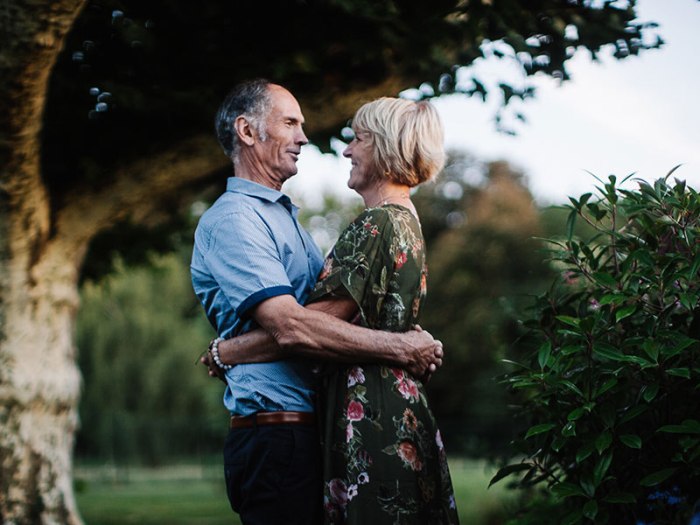Dating After 50: Finding Love in a New Chapter

Dating after 50 is a unique and rewarding experience, offering a chance to connect with someone special on a deeper level after years of life experiences. This stage of life brings a fresh perspective on love, relationships, and what we truly seek in a partner.
While the dating landscape may seem different than in younger years, it presents a wealth of opportunities for individuals to rediscover themselves and explore new possibilities.
This guide delves into the nuances of dating after 50, addressing the challenges and triumphs that come with navigating this exciting phase of life. We’ll explore online dating strategies, discuss building meaningful connections, and provide insights into dating after divorce or widowhood.
We’ll also emphasize the importance of self-care and self-discovery in finding love later in life, encouraging readers to embrace the journey with optimism and a sense of adventure.
The Changing Landscape of Dating After 50

Dating after 50 is a unique experience that differs significantly from the dating scene of younger years. Individuals in this age group bring a wealth of life experience, established values, and often, a clearer understanding of what they want in a partner.
While this can be an advantage, it also presents its own set of challenges and opportunities.
Unique Challenges and Opportunities
Dating after 50 comes with a distinct set of challenges and opportunities that are shaped by life experiences and evolving priorities.
- Life Experience and Priorities: Individuals over 50 have often experienced significant life events, such as career changes, family dynamics, and potential health concerns. These experiences shape their perspectives on relationships and what they seek in a partner. They may be looking for companionship, shared interests, emotional support, or a partner to embark on new adventures.
- Time Constraints: Many individuals over 50 have established careers, family responsibilities, and busy social lives. Finding time for dating can be challenging. This can lead to a more selective approach to dating, prioritizing quality over quantity.
- Fear of Commitment: Some individuals over 50 may have experienced past relationship challenges or may be hesitant to commit to a new relationship. This can stem from a desire to maintain independence or a fear of heartbreak.
- Navigating Online Dating: Online dating platforms have become increasingly popular for individuals over 50. While these platforms offer a wider pool of potential partners, they also come with their own set of challenges, such as navigating online profiles, communicating effectively, and managing safety concerns.
Dating Scene for Men and Women Over 50
The dating scene for men and women over 50 can differ in some aspects. While generalizations should be avoided, it’s worth noting some common observations.
- Gender Ratios: In some age groups, there may be a larger pool of single women than single men. This can lead to a more competitive dating landscape for women.
- Social Expectations: Societal expectations regarding relationships and dating can vary for men and women. For example, some may assume that men are more likely to initiate contact or pursue relationships.
- Relationship Goals: Men and women may have different priorities when it comes to relationships. For example, some men may be looking for a traditional partnership, while some women may be more open to non-traditional relationships or living arrangements.
Navigating Online Dating Platforms
Online dating platforms have become a popular and effective way for people over 50 to meet potential partners. Navigating this digital landscape can be a rewarding experience, opening up a world of possibilities and connections.
Popular Dating Platforms for Over 50s
Several dating platforms cater specifically to the over-50 demographic, offering a more refined and targeted experience.
- SilverSingles: This platform focuses on mature singles, emphasizing compatibility based on shared values, interests, and life goals. It uses a detailed personality test to match users with like-minded individuals.
- OurTime: OurTime is another popular choice for mature singles, featuring a user-friendly interface and a wide range of features to connect with others. It prioritizes genuine connections and fosters a supportive community for users over 50.
- Match.com:While not exclusively for the over 50 demographic, Match.com has a large and active user base, including a significant number of mature singles. Its extensive search filters and advanced matching algorithms allow users to find compatible partners based on their specific preferences.
Creating Compelling Profiles
A well-crafted profile is crucial for attracting attention and sparking meaningful conversations.
- Highlight Your Best Qualities: Emphasize your unique personality, interests, and passions. Use clear and concise language to describe your hobbies, values, and what you’re looking for in a partner. For instance, instead of saying “I like to travel,” specify “I love exploring new cultures and have a passion for photography, capturing the beauty of each destination.”
- Use High-Quality Photos: Choose recent, well-lit photos that showcase your genuine self. Include a variety of images that reflect your interests and personality. For example, a photo of you enjoying a hike, volunteering at a local charity, or attending a cultural event can provide insights into your lifestyle and passions.
- Be Honest and Authentic: Authenticity is key. Present yourself genuinely, and be open about your hopes, dreams, and expectations. Avoid embellishing or hiding aspects of your life, as it will only lead to disappointment in the long run.
Writing Engaging Messages
Initiating a conversation can be daunting, but a well-written message can make a lasting impression.
- Start with a Personal Touch: Instead of generic greetings, try to personalize your message by referencing something specific from their profile. For example, “I noticed you mentioned a love for classic movies. What’s your favorite film?” This demonstrates genuine interest and sparks conversation.
- Keep It Short and Sweet: Long, rambling messages can be overwhelming. Focus on a few key points to convey your interest and encourage a response. For instance, “I’m intrigued by your love for gardening. I’ve always wanted to start my vegetable patch.What are some tips you could share?”
- Ask Open-Ended Questions: Encourage a back-and-forth exchange by asking questions that prompt meaningful responses. For example, “What are some things you enjoy doing in your free time?” or “What’s a memorable travel experience you’ve had?”
Navigating the Online Dating Experience, Dating after 50
Online dating can be a rewarding experience, but it’s important to be mindful of certain aspects.
- Stay Safe and Secure: Prioritize your safety by never sharing personal information like your address or phone number before meeting in person. Be cautious about sharing financial details and avoid suspicious requests for money.
- Be Patient and Persistent: Finding the right connection takes time. Don’t get discouraged if you don’t find a match immediately. Keep refining your profile, sending messages, and exploring different platforms.
- Focus on Building Genuine Connections: Online dating is about forging authentic relationships, not just accumulating matches. Engage in meaningful conversations, ask questions, and get to know people beyond their profiles.
Building Connections and Relationships

Dating after 50 often involves navigating a unique landscape where past experiences and evolving priorities shape the search for meaningful connections. Building lasting relationships requires a deliberate approach, emphasizing open communication, shared interests, and a willingness to embrace the challenges that come with dating later in life.
The Importance of Communication and Shared Interests
Effective communication is paramount in any relationship, but it takes on even greater significance when dating after 50. As individuals have accumulated life experiences, perspectives, and values, the ability to express oneself clearly and listen attentively becomes crucial. Shared interests provide a foundation for meaningful conversations, shared activities, and a sense of common ground.
Engaging in activities that both partners enjoy fosters a sense of connection and provides opportunities for shared experiences that strengthen the bond.
Strategies for Overcoming Common Relationship Obstacles
Dating after 50 often presents unique challenges, such as navigating past relationships, managing expectations, and addressing potential differences in lifestyle or life goals. Open communication, patience, and a willingness to compromise are essential for overcoming these obstacles.
- Honesty and Transparency: Being upfront about expectations, past experiences, and personal values creates a foundation of trust and understanding.
- Flexibility and Compromise: Relationships require a willingness to adapt and compromise, particularly when dealing with differing perspectives or life experiences.
- Respect for Individuality: Recognizing and respecting each other’s individual needs, preferences, and boundaries fosters a healthy and fulfilling relationship.
Building Trust and Intimacy in New Relationships
Trust and intimacy are fundamental elements of any lasting relationship. Building these foundations requires time, effort, and a commitment to open communication and vulnerability.
- Consistent Communication: Regular and honest communication helps build trust and intimacy by fostering a sense of connection and understanding.
- Quality Time: Spending quality time together, engaging in meaningful conversations, and sharing experiences strengthens the bond and fosters intimacy.
- Vulnerability and Emotional Connection: Sharing feelings, thoughts, and experiences creates a deeper emotional connection and fosters trust.
Dating After Divorce or Widowhood: Dating After 50
Dating after a significant life change like divorce or widowhood can be a complex and emotionally charged experience. It involves navigating the emotional landscape of grief, healing, and self-discovery while simultaneously opening yourself up to the possibility of new love.
Challenges of Dating After Divorce or Widowhood
This phase often brings a unique set of challenges. The emotional impact of divorce or widowhood can make it difficult to move on and embrace the idea of dating again. Feelings of grief, anger, sadness, and fear are common. These emotions can affect self-esteem, making it hard to feel confident and attractive.
Practical considerations like single parenting, financial stability, and the fear of repeating past mistakes can further complicate the dating process.
Resources and Support Systems
Navigating this period doesn’t have to be done alone. Several resources and support systems are available to individuals facing the challenges of dating after divorce or widowhood.
- Support Groups: Connecting with others who have experienced similar situations can provide a sense of community, shared understanding, and practical advice. Support groups offer a safe space to process emotions, share experiences, and gain insights from others.
- Therapy: Individual or couples therapy can provide valuable guidance in navigating the emotional and practical aspects of dating after divorce or widowhood. A therapist can help individuals address unresolved issues, develop healthy coping mechanisms, and gain clarity on their dating goals.
- Online Communities: Online forums and social media groups dedicated to dating after divorce or widowhood offer a platform for connecting with others, sharing experiences, and accessing valuable resources. These communities provide a sense of belonging and offer opportunities for peer support.
Strategies for Moving On and Finding Love Again
Re-entering the dating world after a significant life change requires a conscious effort to heal, rediscover yourself, and embrace the possibility of love again.
- Self-Care: Prioritizing self-care is essential for emotional well-being. Engaging in activities that bring joy, relaxation, and personal growth can help individuals build resilience and self-confidence.
- Reflection and Self-Discovery: Taking time to reflect on the past relationship, identify lessons learned, and understand your personal needs and desires can provide clarity on what you want in a future relationship.
- Setting Realistic Expectations: Dating after divorce or widowhood often involves adjusting expectations. It’s crucial to be patient, embrace the process of getting to know someone and avoid rushing into a new relationship.
- Open Communication: Honest and open communication is essential for building healthy relationships. Being upfront about your past experiences and emotional needs can help establish trust and understanding with potential partners.
- Dating with Intention: Instead of focusing on finding “the one,” approach dating to meet new people, explore connections, and enjoy the process of getting to know someone.
Dating with Health and Wellness in Mind

Dating after 50 brings a new dimension to relationships, and it’s essential to consider your physical and mental well-being. This stage of life often comes with health considerations, and understanding these aspects can enhance your dating journey.
Maintaining a Healthy Lifestyle
Maintaining a healthy lifestyle is crucial for overall well-being, especially as you navigate the dating scene. This includes:
- Regular Exercise: Engaging in regular physical activity not only improves physical health but also boosts mood and energy levels. Aim for at least 30 minutes of moderate-intensity exercise most days of the week. Consider activities you enjoy, such as walking, swimming, dancing, or cycling.
- Balanced Diet: A balanced diet rich in fruits, vegetables, whole grains, and lean protein provides essential nutrients for optimal health. Limit processed foods, sugary drinks, and excessive saturated and unhealthy fats.
- Adequate Sleep: Getting enough sleep is vital for both physical and mental health. Aim for 7-8 hours of quality sleep each night.
- Stress Management: Stress can negatively impact your health and relationships. Find healthy ways to manage stress, such as meditation, yoga, deep breathing exercises, or spending time in nature.
Finding Compatible Partners
When dating after 50, it’s important to find a partner who aligns with your health and wellness goals.
- Shared Values: Look for someone who values a healthy lifestyle and shares your commitment to maintaining well-being.
- Open Communication: Be open and honest about your health needs and preferences. Communicate your expectations and boundaries regarding physical activity, diet, and other health-related matters.
- Mutual Support: Find a partner who encourages and supports your health goals. A supportive partner can motivate you to stay active, eat healthy, and manage stress.
Navigating Potential Health Concerns and Limitations
Dating after 50 may involve navigating potential health concerns or limitations.
- Open and Honest Communication: Be upfront about any health conditions you have, including limitations or medications you take. This allows potential partners to understand your needs and make informed decisions.
- Respectful Understanding: Approach dating with respect for each other’s health and limitations. Be understanding and accommodating when necessary.
- Focus on Shared Interests: Find common ground and focus on activities you can both enjoy, regardless of any limitations.
- Seeking Professional Guidance: If you have significant health concerns, consider seeking guidance from a therapist or counselor to navigate dating and relationships.
The Importance of Self-Care and Self-Discovery

Dating after 50 can be an exciting and rewarding experience, but it’s essential to prioritize self-care and self-discovery throughout the journey. Taking time for yourself allows you to gain clarity about your values, needs, and desires in a relationship.
This self-reflection can help you attract a compatible partner and build a fulfilling connection.
Prioritizing Self-Care
Self-care encompasses activities that nourish your physical, emotional, and mental well-being. It’s not about being selfish; it’s about investing in yourself so you can show up as your best self in all aspects of your life, including dating. Here are some examples of self-care practices:
- Engage in regular exercise, such as walking, swimming, or yoga. Physical activity releases endorphins, which have mood-boosting effects.
- Prioritize sleep. Aim for 7-9 hours of quality sleep each night to promote physical and mental restoration.
- Practice mindfulness through meditation, deep breathing exercises, or spending time in nature. These practices help reduce stress and enhance emotional well-being.
- Nurture your social connections. Spend time with loved ones, join social groups, or volunteer in your community. Strong social bonds contribute to overall happiness and well-being.
- Engage in hobbies and activities that bring you joy. Whether it’s reading, painting, gardening, or traveling, pursuing your passions helps you feel fulfilled and energized.
Exploring Self-Discovery
Self-discovery is a continuous process of exploring your values, beliefs, and aspirations. It involves examining your past experiences, identifying your strengths and weaknesses, and understanding what truly matters to you. Here are some ways to engage in self-discovery:
- Reflect on your past relationships. What worked well? What didn’t? What are your relationship patterns? Understanding your past can provide valuable insights into your present and future relationships.
- Journaling can be a powerful tool for self-reflection. Write about your thoughts, feelings, and experiences. Regular journaling can help you gain clarity about your priorities and goals.
- Seek out opportunities for personal growth. Take a class, read a book, attend workshops, or engage in activities that challenge you intellectually or emotionally.
- Engage in conversations with trusted friends or family members. Sharing your thoughts and feelings with others can provide valuable perspectives and support.
Setting Boundaries and Knowing What You Want
Setting boundaries is essential for protecting your emotional well-being and ensuring that your needs are met in a relationship. Boundaries are guidelines that define what you are and are not willing to tolerate in a relationship. Here are some tips for setting healthy boundaries:
- Identify your non-negotiables. What are the deal-breakers in a relationship? What are your core values and principles?
- Communicate your boundaries clearly and assertively. Be direct about your needs and expectations.
- Be prepared to enforce your boundaries. This may involve saying “no” to requests that make you uncomfortable or violate your values.
- Don’t be afraid to walk away from a relationship that doesn’t respect your boundaries.
Conclusive Thoughts

Dating after 50 is not about settling, but rather about embracing the wisdom and experiences that come with age. It’s about finding a partner who complements your life, shares your values, and supports your growth. Whether you’re seeking companionship, romance, or a lifelong partner, remember that love knows no age limit.
Embrace the journey, stay open to possibilities, and enjoy the adventure of finding love in a new chapter of your life.
Comments are closed.